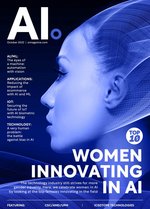Five minutes with Sue Tripathi, Accenture

Tell me about your work with Accenture. What have you achieved there? What do you enjoy most?
My work at Accenture as a senior leader is to help our clients reach their business outcomes through the use of Data and Applied Intelligence (which includes Artificial Intelligence). This sounds far-fetching and very high level since data at a minimum involves data assessment, management and/or governance (management is actually part of governance), while AI ranges from the application of machine learning to neural networks, deep learning, metaverse etc. At the core of what I do is to involve technology with process and people, the basic trifecta, to understand, evolve, design, build, solve and apply tools, technical solutions, and go-to-market assets that enable our existing and potential clients to make the best decisions for themselves.
I have been fortunate to be a global leader – as a speaker and panellist – and what I enjoy most is the human interaction, conversations internally and externally, thinking big and inventing, putting the pieces together of a jigsaw puzzle, collaborating with internal teams, be it strategy and consulting, industry X, operations, song or technology. I think, in this day and age, the confluence of humans and technology, when applied appropriately and without bias, may yet yield the best insights. Saying hello to human connections and gleaning valuable knowledge through those conversations enables when, what and how to apply data and AI.
What interests you about AI? Why did you choose to get into the field?
When I began my journey 27 years ago, AI was not part of our lingo in the workplace. I began with data, having led and built data, evaluation, quality, performance, compliance, and audit departments while managing multi-million dollar contracts and learning how to build budgets, pre-sales, and go-to-market assets. During this quarter-century journey, I got certified in organisational change management, lean management, evaluation (programme, developmental, empowerment, quantitative, qualitative) and applied various statistical methods, quality management and project management methods along with AI.
So the transition was very natural, because, by nature, if you are curious, eager, want to be ‘right’ and not afraid to confess what you don’t know, you will learn. And in the workplace, it is at times learning by trial and error. There is no playbook that determines continued and sustained success every time. But the core of why I chose to get into the field is to take all these skills and apply it to all communities; that is, apply AI in the socio-technical context – a term coined by the National Institutes of Science and Technology (NIST) in the US. While NIST applies this socio-technical approach in the context of reducing bias in AI, the practical application of AI, is a universal platform that promotes public-private partnerships, enabling people and organisations across the globe to reach their goals.
What key trends do you see emerging in AI in the coming years?
As I scour market trend reports, review competitive intelligence and disruptors in the field, some key emerging trends in AI have been around for a while and are in the second iteration of exploring further capabilities. These include: language models, where machine learning determines how phrases, sentences and paragraphs are related, ingesting large amounts of texts and building a statistical model; bias removal in machine learning; natural language processing (NLP), which has already revolutionised how humans interact with machines through understanding the meaning of text or speech (e.g. Siri, Alexa) and is now in the throes of helping in scaling business operations; reinforcement learning, mimicking how we learn, widely used in robotics, financial trading, games and data science; multimodal learning – that is, learning from sensory input like images, text, speech, sound and video.
Looking back over your career, what advice would you give those starting in the field of AI?
My advice is to know yourself and don’t spend too much time being a perfectionist in everything. Go deep in an area that speaks to you, learn it, practise and eventually become a coach or mentor to others – especially those not in the field. The beauty of living in the age of high connectivity is that information can be sifted at lightning speed.
Ask for help, from senior leaders, your peers and family members. I have worked and learned new methodologies from experts because I asked, read, stumbled, clarified and applied my learning.
Those starting in the field of AI should ask why they want to be in this field and spend a good part of their life in it. For me, one key driver is promoting the use of AI that benefits humanity, part of corporate social responsibility. Ask yourself what drives you and how you can contribute to this field.
What else do you hope to learn in your career? What do you hope to achieve?
I think with COVID-19, we may have fundamentally shifted in our collective thought processes regarding what we want to learn in our careers.
For me, personally and professionally, it is what I want to learn in the time I have while I give due diligence to the task at hand. I am interested in far too many things to learn – the use of AI in music; diversity, equity and inclusion that have implications in hiring practices; access to vaccines and identification of behavioural health conditions; psychographic segmentation of consumers (not easy to do) etc.
At the end of the day, my hope is that in my career, I am contributing to and aligning with key core values, with clients at the centre to improve their experience. Learning is continuous; it is not limited to one’s career. My “hope” is that AI has the potential to help humans make more “equitable” decisions.







